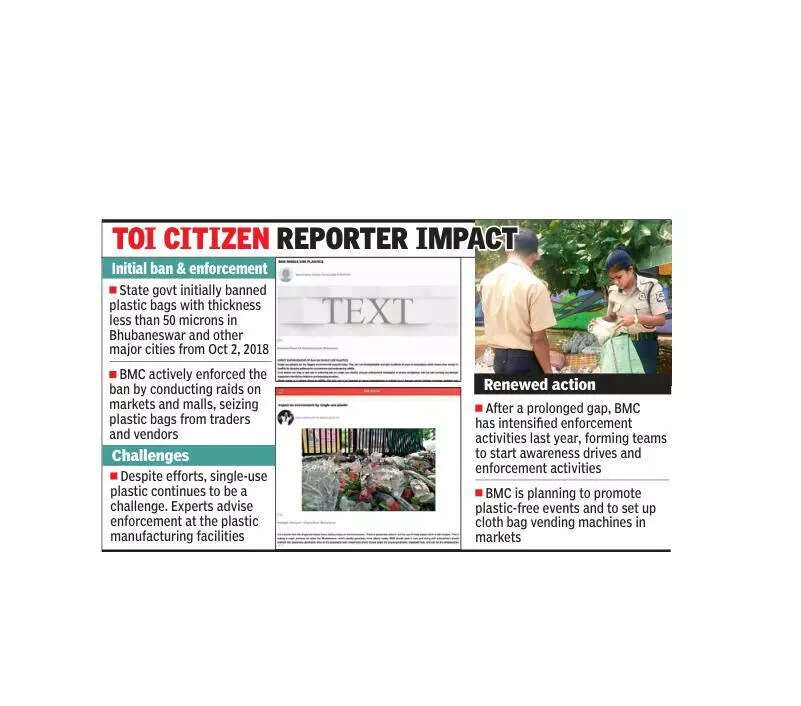BMC to restart drive against single-use plastic after prod by citizen reporters | Bhubaneswar News

Bhubaneswar: Taking a stern approach, the Bhubaneswar Municipal Corporation (BMC) has decided to re-launch its enforcement and awareness activities on single-use plastic, after several citizen reporters raised the issue recently.
In a post on TOI’s Citizen Reporter app, Santosh Kumar Pradhan wrote, “Single-use plastics are the biggest environmental hazards. They are non-biodegradable and take years to decompose, which means they remain in landfills for decades, polluting the environment and endangering wildlife.”
He said civic bodies can play a vital role in enforcing the ban on single-use plastic through enforcement campaigns to ensure compliance, carrying out periodic inspections, identifying violations and imposing penalties.
“Plastic waste is a serious threat to wildlife. Not only can it be ingested or get entangled in animals, but it disrupts animal habitats, increases pollution and introduces potentially toxic substances into their environment,” he wrote.
He further stated that plastic pollution harms aquatic life and can cause microplastics to enter the ecosystems and water sources, potentially harming human and animal health. “A campaign with catchy slogans may be launched like ‘Carry your bags, or Say no to plastic’,” he suggested.
Another citizen reporter, Sumiit Miishra, posted, “It is a known fact that single-use plastic has a lasting impact on the environment. There is awareness about it, but the use of these plastic items by the people is still rampant.”
He stated that this is putting major pressure on bigger cities like Bhubaneswar, which usually generate more plastic waste. “The BMC, the civic authority of Bhubaneswar, should step in and, along with enforcement, should intensify the awareness drive at the grassroots level,” he wrote.
Sumiit suggested that the awareness campaign should target the young generation, especially kids, who can be the ambassadors of change. “The BMC needs to stay more proactive. After all, plastic is damaging the environment to the highest level,” he said.
Responding to the complaints, city mayor Sulochana Das told TOI that enforcement activities on single-use plastic took a break due to the end of financial year. “April has started, and we are soon going to reactivate our enforcement teams,” she said.
Das said they regularly generate awareness on single-use plastic and will continue to do so, especially among vendors. “It is not possible to crack down on the manufacturing facilities since the items are procured from outside the state,” said Das, calling for collective efforts from the vendors as well as citizens to make Bhubaneswar free of single-use plastic.
In a post on TOI’s Citizen Reporter app, Santosh Kumar Pradhan wrote, “Single-use plastics are the biggest environmental hazards. They are non-biodegradable and take years to decompose, which means they remain in landfills for decades, polluting the environment and endangering wildlife.”
He said civic bodies can play a vital role in enforcing the ban on single-use plastic through enforcement campaigns to ensure compliance, carrying out periodic inspections, identifying violations and imposing penalties.
“Plastic waste is a serious threat to wildlife. Not only can it be ingested or get entangled in animals, but it disrupts animal habitats, increases pollution and introduces potentially toxic substances into their environment,” he wrote.
He further stated that plastic pollution harms aquatic life and can cause microplastics to enter the ecosystems and water sources, potentially harming human and animal health. “A campaign with catchy slogans may be launched like ‘Carry your bags, or Say no to plastic’,” he suggested.
Another citizen reporter, Sumiit Miishra, posted, “It is a known fact that single-use plastic has a lasting impact on the environment. There is awareness about it, but the use of these plastic items by the people is still rampant.”
He stated that this is putting major pressure on bigger cities like Bhubaneswar, which usually generate more plastic waste. “The BMC, the civic authority of Bhubaneswar, should step in and, along with enforcement, should intensify the awareness drive at the grassroots level,” he wrote.
Sumiit suggested that the awareness campaign should target the young generation, especially kids, who can be the ambassadors of change. “The BMC needs to stay more proactive. After all, plastic is damaging the environment to the highest level,” he said.
Responding to the complaints, city mayor Sulochana Das told TOI that enforcement activities on single-use plastic took a break due to the end of financial year. “April has started, and we are soon going to reactivate our enforcement teams,” she said.
Das said they regularly generate awareness on single-use plastic and will continue to do so, especially among vendors. “It is not possible to crack down on the manufacturing facilities since the items are procured from outside the state,” said Das, calling for collective efforts from the vendors as well as citizens to make Bhubaneswar free of single-use plastic.
















